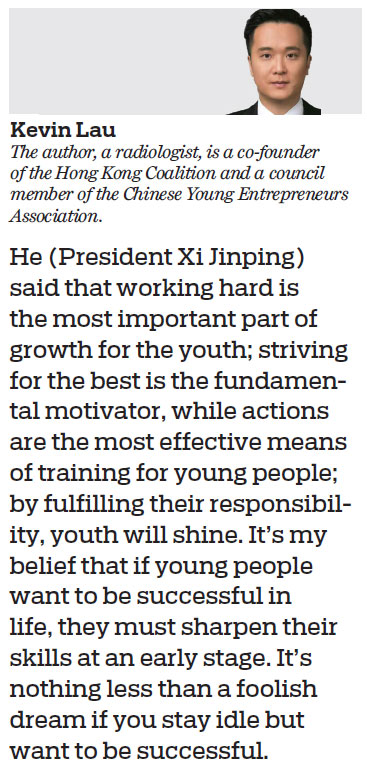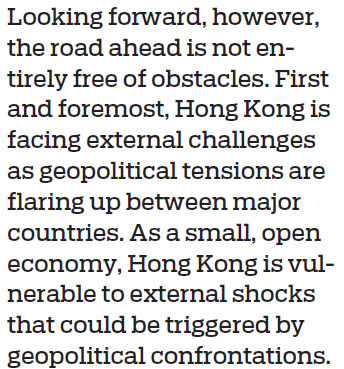Young people have major role to play in HKSAR's development

The 25th anniversary of the establishment of the Hong Kong Special Administrative Region is a good time not only for reflecting on the significant achievements the HKSAR has made but also for looking forward to a much brighter future to be realized by leveraging new advantages.
As Wang Linggui, deputy director of the Hong Kong and Macao Affairs Office of the State Council, pointed out recently, with the implementation of the National Security Law for Hong Kong, the improvement of the HKSAR's electoral system, and the successful completion of three important elections, Hong Kong is now back on the right track; it is marching toward a new chapter of socioeconomic development for even greater prosperity.
Looking forward, however, the road ahead is not entirely free of obstacles. First and foremost, Hong Kong is facing external challenges as geopolitical tensions are flaring up between major countries. As a small, open economy, Hong Kong is vulnerable to external shocks that could be triggered by geopolitical confrontations.
Hong Kong must be forward-looking and "think outside the box" when planning for the anticipated challenges ahead. To augment its overall capacity to withstand external challenges, the city must strive not only to enhance its status as an international financial, trade and logistics center by strengthening its position as the premier offshore renminbi business hub, an international asset management center and a risk management center, but also to establish itself as a center for international legal and dispute resolution services in the Asia-Pacific region, as well as to promote the development of high-end, or high-value-added, service industries.
Furthermore, the city must also consolidate its status as an international aviation hub; develop itself into an international innovation and technology hub and a regional intellectual property trading center; and develop itself into a hub for arts and cultural exchanges between China and the rest of the world. Hong Kong can always count on the central government for support in pursuing these objectives; the nation's 14th Five-Year Plan (2021-25) has provided for that. Further integrating Hong Kong's socioeconomic development into national development is another way to buttress the city against external shocks. Recently, the Guangdong provincial government proposed a new model for the development of the Guangdong-Hong Kong-Macao Greater Bay Area in the coming five years - "living in Hong Kong and Macao, working on the mainland; conducting research in Hong Kong and Macao, transforming the R&D results into products in the mainland". It is believed that this model not only can put Hong Kong's advantages to good use but also is well in line with Hong Kong's future development.
With a population of more than 70 million, the GBA is one of the regions with the highest GDP per capita and the strongest economic strength in China. Close cooperation with other GBA cities, in various areas, is undoubtedly crucial for and tremendously beneficial to Hong Kong's future socioeconomic development. For instance, the urban insurance penetration rate in the mainland cities within the GBA is merely 6 percent. Hong Kong's insurance products are uniquely designed and popular with many mainland residents. In fact, 40 percent of Guangdong residents have considered coming to Hong Kong to buy insurance policies, according to studies. In terms of finance, it is expected that the GBA's banking revenue will reach $185 billion by 2025, with a compound annual growth rate of more than 10 percent. Also, there will be as many as 450,000 wealthy households holding investable assets of more than 6 million yuan ($896,000) by then. The total amount ready for investment is estimated to be at least 2.7 trillion yuan, which is a ready market for Hong Kong's finance sector. In addition, medical institutions in Hong Kong should also establish more medical facilities in Tung Chung, the future Northern Metropolis as well as Hong Kong's foothold of the Hong Kong-Zhuhai-Macao Bridge. The facilities will provide diversified services to fill the medical service gap of up to $50 billion for Guangdong residents.
Young people are the future of Hong Kong. They do have a role in Hong Kong's socioeconomic development and can help cope with the challenges ahead by offering constructive suggestions or ideas. At the 100th anniversary of the founding of the Communist Youth League of China not too long ago, President Xi Jinping expressed his expectations for young people, calling on them to "conscientiously shoulder responsibilities and become the vanguard and pioneer of China's new generation". He said that working hard is the most important part of growth for the youth; striving for the best is the fundamental motivator, while actions are the most effective means of training for young people; by fulfilling their responsibility, youth will shine. It's my belief that if young people want to be successful in life, they must sharpen their skills at an early stage. It's nothing less than a foolish dream if you stay idle but want to be successful.
It's fortunate that young people no longer need to burden themselves with worries about the direction and future of Hong Kong. Wang has pointed out the direction: "The practice of 'one country, two systems' in Hong Kong should be implemented along the benchmark of "cultivating new advantages, developing new roles, realizing new developments and making new contributions." Young people are full of creativity who can think outside the box. Hence, this new benchmark suits their disposition. While the overall direction for Hong Kong's socioeconomic development has been set by the central government, there are still other details to be considered, such as what new advantages Hong Kong should create, what new role Hong Kong should play, and what new development Hong Kong should seek to benefit local residents and contribute to national development. As Wang puts it, only with new development and new advantages can Hong Kong play a new role in national development and contribute to it. How Hong Kong can develop and leverage new advantages very much depends on the city's creativity. Young people who are full of energy and creativity should proactively come up with constructive recommendations and make contributions. All these are issues that young people in Hong Kong should take time to ponder over.
The views do not necessarily reflect those of China Daily.



- Beijing courts boost efforts to resolve livelihood-related cases
- Reminder tips from Weifang police spark buzz on Xiaohongshu
- Former head of national tobacco body stands trial on bribery charges
- China warns DPP's attempt to seek 'Taiwan independence' will be futile
- Consistent progress seen in environmental protection
- Former head of China's State Tobacco Monopoly stands trial for graft, abuse of power





































